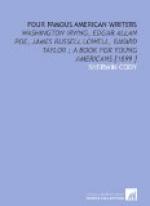He was sent to Concord during this interval to carry on his studies under the minister of the town. Here he found it pretty dull, though Emerson and Thoreau were there. But he did not then care for either one of them. In one of his letters he said, “I feel like a fool. I must go down and see Emerson and if he doesn’t make me feel more like one, it won’t be for want of sympathy. He is a good-natured man in spite of his doctrines.”
Of Thoreau he said, “I met (him) last night, and it is exquisitely amusing to see how he imitates Emerson’s tone and manner. With my eyes shut I shouldn’t know them apart.”
In the autumn he came back to Cambridge and took his degree of Bachelor of Arts with his class.
CHAPTER IV
HOW LOWELL STUDIED LAW
While at Concord, Lowell wrote to his friend Loring, as though explaining himself.
“Everybody almost is calling me ‘indolent.’ ’Blind dependent on my own powers’ and ‘on fate.’ Confound everybody! since everybody confounds me. Everybody seems to see but one side of my character, and that the worst. As for my dependence on my own powers, ’tis all fudge. As for fate, I believe that in every man’s breast are the stars of his fortune, which, if he choose, he may rule as easily as does the child the mimic constellations in the orrery he plays with. I acknowledge, too, that I have been something of a dreamer, and have sacrificed, perchance, too assiduously on that altar to the ‘unknown God,’ which the Divinity has builded not with hands in the bosom of every decent man, sometimes blazing out clear with flame, like Abel’s sacrifice, heaven-seeking; sometimes smothered with greenwood and earthward, like that of Cain. Lazy quota! I haven’t dug, ’tis true, but I have done as well, and ’since my free soul was mistress of her choice, and could of books distinguish her election,’ I have chosen what reading I pleased and what friends I pleased, sometimes scholars and sometimes not.”
Once out of college he had to take up some profession. Had poetry been a profession, he would have taken that; but such a choice at that time would have been considered sheer folly. He did not consider that he had any “call” to be a minister, still less a doctor. As there was nothing else left, he began the study of law. It is truly amusing to see how he manages to “wriggle along” until he takes his degree of LL.B. and is admitted to the bar.
First, he announces that he is “reading Blackstone with as good a grace and as few wry faces as he may.” Only a few days later he declares, “A very great change has come o’er the spirit of my dreams. I have renounced the law.” He is going to be a business man, and sets about looking for a place, in a store. He is going to give up all thoughts of literary pursuits and devote himself to money-making. He also says, “I have been thinking seriously of the ministry, but then—I have also thought of medicine, but then—still worse!”




